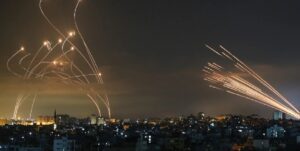Hezbollah-Israel Tensions: War Threats and Regional Stability
Hezbollah-Israel tensions escalate with warnings of potential conflict. Threats exchanged over military targets and regional stability concerns. Analysts cautious amid heightened rhetoric, foreseeing risks of destabilization.
CONTENTS: Hezbollah-Israel Tensions: War Threats and Regional Stability

Israel vs. Hezbollah: Air defense worry
Hezbollah-Israel Tensions: War Threats and Regional Stability
Three US officials informed CNN that in a scenario of all-out conflict between Israel and Hezbollah, the Iran-supported militant organization might be capable of overcoming Israel’s air defence systems, including the highly respected Iron Dome.
This concern arises as Israel readies itself for potential military actions, both on land and in the air, within Lebanon. The Iron Dome, established in 2011 with support from the US, has been pivotal in safeguarding Israel against missile threats
The Iron Dome system played a crucial role in countering a barrage of missiles from Hamas in October of last year. However, its design primarily targets low-altitude, slow-moving projectiles, which could potentially leave it vulnerable to the more sophisticated, precision-guided munitions that Hezbollah has acquired from Iran over the years.
US officials are concerned that Hezbollah’s extensive arsenal of missiles and drones poses a significant challenge to the Iron Dome. Designed to intercept and destroy short-range rockets, mortars, and artillery shells within distances of 4 to 70 kilometers, the Iron Dome has a strong operational history, successfully intercepting over 5,000 projectiles including rockets, mortars, artillery shells, aircraft, helicopters, and UAVs.
Iron Dome faces Hezbollah precision threat
According to a senior US administration official speaking to CNN, there is an assessment that in a conflict with Hezbollah, some Iron Dome batteries could be overwhelmed. This concern is heightened if Hezbollah were to mount a large-scale attack using precision-guided weapons, as suggested by an Israeli official.
Recent events, including a purported drone strike on an Iron Dome battery in northern Israel by Hezbollah, have underscored worries about the system’s vulnerability, particularly in that region, although the Israeli Defence Forces (IDF) reported no damage.
In anticipation of potential conflict with Hezbollah, Israeli officials have informed the US about plans to redeploy resources from southern Gaza to northern Israel. This strategic adjustment highlights the perceived seriousness of the threat posed by Hezbollah, which possesses an arsenal of approximately 150,000 rockets and missiles, including thousands of precision munitions.
War threats tempered by cautious restraint
Efforts to prevent wider conflict have led to diplomatic initiatives aimed at de-escalation. US special envoy Amos Hochstein has been actively engaged in advocating for ceasefire agreements and negotiating diplomatic arrangements between Israel and Hezbollah. Despite these efforts, cross-border attacks have continued to escalate, with Hezbollah launching rockets and drones in solidarity with Hamas following the Gaza conflict that began in October 2023.
US officials are particularly concerned about the broader regional consequences of potential conflict between Israel and Hezbollah. This includes the involvement of other Iran-backed proxy groups and the safety of US troops in the Middle East. There are uncertainties about the extent of regional support for Israel if a larger conflict were initiated.
Both Israel and Hezbollah have escalated their rhetoric, with Hezbollah leader Hassan Nasrallah warning that in the event of war, Hezbollah’s response would be unrestrained.
Hezbollah leader Hassan Nasrallah also cautioned that Israel’s bases in the eastern Mediterranean, such as those in Cyprus, could become targets if Israel launches strikes against Lebanon.
Meanwhile, Israeli Prime Minister Benjamin Netanyahu delivered a strong message, warning that if war erupts, Israel would treat Beirut similarly to how it handles Gaza.
Despite these statements, analysts suggest that neither party is inclined towards a full-scale war, acknowledging the significant dangers and the potential for destabilizing the region.
Check out TimesWordle.com for all the latest news
You must be logged in to post a comment.